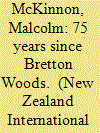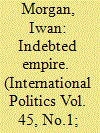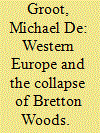| Srl | Item |
| 1 |
ID:
167988


|
|
|
|
|
| Summary/Abstract |
Malcolm McKinnon reflects on changes in the global monetary and financial system, and New Zealand’s place in it, since the ground-breaking Bretton Woods conference of July 1944.
|
|
|
|
|
|
|
|
|
|
|
|
|
|
|
|
| 2 |
ID:
086298


|
|
|
|
|
| Publication |
2008.
|
| Summary/Abstract |
America is like no other dominant power in modern history because it depends on other countries for capital to sustain its military and economic dominance. The US current-account deficit, comprised primarily of the trade deficit and interest payments on America's external debt to foreign investors, has ballooned since 1997 to reach an annual rate in excess of 6 percent in mid-2005. The US is tied into a co-dependency with Asian countries, which fund its borrowing in order that their export-driven economies have the benefit of competitive exchange rates to sell their goods to Americans. Although some analysts have characterized this relationship as Bretton Woods 2, it is inherently unstable. The US requires Asian countries to continue purchasing massive quantities of dollar reserves but their capacity and need to do so are finite. When Asia stops buying dollars, the American economy will experience problems that will have implications for America's global power. To avert this risk, the US needs to reduce its own governmental budget deficit and promote international agreement for currency and other economic adjustments that can help to rebalance trade flows.
|
|
|
|
|
|
|
|
|
|
|
|
|
|
|
|
| 3 |
ID:
186594


|
|
|
|
|
| Summary/Abstract |
Why has gold persisted as a significant reserve asset despite momentous changes in international monetary relations since the collapse of the classical gold standard? IPE theories have little to say about this question. Conventional accounts of international monetary relations depict a succession of discrete monetary regimes characterized by specific power structures or dominant ideas. To explain the continuous importance of gold, we draw on insights from social psychology and new materialist theories. We argue that international monetary relations should be understood as a complex assemblage of material artifacts, institutions, ideas, and practices. For much of its history, this assemblage revolved around the pivotal practice of referencing money to gold. The centrality of gold as experienced by policymakers had important effects. Using archival and other evidence, we document these effects from the 1944 Bretton Woods conference through the transition to floating exchange rates in the mid-1970s; most IPE scholars underestimate the role of gold during this period. Power relations and economic ideas were obviously important, but they contributed little to a fundamental development: the long process of reluctantly coming to terms with the limitations of specie-backed currency, and the progressive and still ongoing decentering of gold in international monetary relations.
|
|
|
|
|
|
|
|
|
|
|
|
|
|
|
|
| 4 |
ID:
154168


|
|
|
|
|
| Summary/Abstract |
During the 1960s Italy and Greece were undergoing rapid economic and social changes that were significant in both their economic and political ramifications. US policy was able to influence the course of events either bilaterally or multilaterally in the context of the Bretton Woods nexus of institutions and procedures. The central argument of this essay is that Washington's policy was formulated under various contradictory considerations. Cardinal among them was the necessity of preserving the basic requirements of the Bretton Woods regime. The stability of currency parities, particularly the safeguarding of the preeminent position of the dollar as an international reserve currency and its credibility against gold, dictated the continuation of orthodox monetary and fiscal policies. Political stability in Italy and Greece as a prop against political radicalization was a strategic consideration that militated against a strict application of a deflationary policy. The development of transatlantic relations with Charles de Gaulle's France posed a problem from an Allied perspective and was a factor that also militated against the strict application of a policy of monetary stability.
|
|
|
|
|
|
|
|
|
|
|
|
|
|
|
|
| 5 |
ID:
167230


|
|
|
|
|
| Summary/Abstract |
This article contends that Western Europe played a crucial and overlooked role in the collapse of Bretton Woods. Most scholars highlight the role of the United States, focusing on the impact of US balance of payments deficits, Washington’s inability to manage inflation, the weakness of the US dollar, and American domestic politics. Drawing on archival research in Britain, Germany, the Netherlands, and the United States, this article argues that Western European decisions to float their currencies at various points from 1969 to 1973 undermined the fixed exchange rate system. The British, Dutch, and West Germans opted to float their currencies as a means of protecting against imported inflation or protecting their reserve assets, but each float reinforced speculators’ expectations that governments would break from their fixed parities. The acceleration of financial globalization and the expansion of the Euromarkets in the 1960s made Bretton Woods increasingly difficult to defend.
|
|
|
|
|
|
|
|
|
|
|
|
|
|
|
|